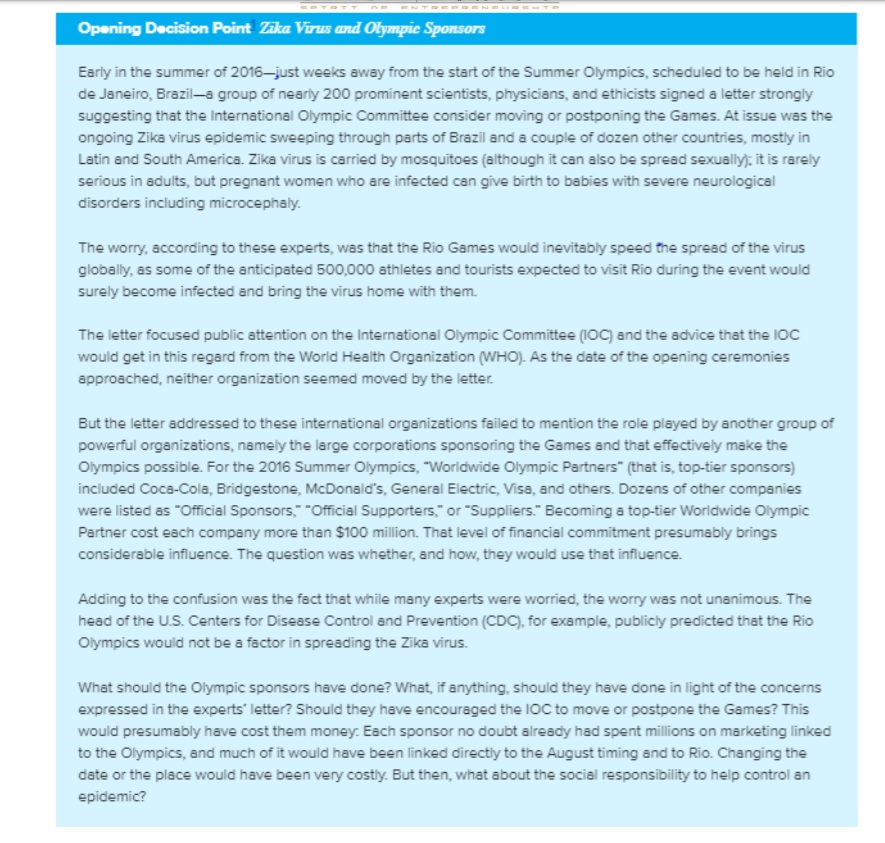Hello, I need your support to solve this case,( Zika virus will replace with COVID-19 our current situation )
What advice would you offer to the Olympics sponsors?
What judgment would you make about this case from a financial perspective?
Is there any financial risk implied byencouragingthe IOC togo aheadwith the Rio Olympics as planned?
After offering your analysis and recommendations, reflect on your own thinking and describe what values underlie those recommendations.
?What facts would help you make your decision?
?Does the scenario raise values that are particular to managers?
?What stakeholders should be involved in your advice?
?What values do you rely on in offering your advice?
Opening Decision Point Zika Virus and Olympic Sponsors Early in the summer of 2016-just weeks away from the start of the Summer Olympics, scheduled to be held in Rio de Janeiro, Brazil-a group of nearly 200 prominent scientists, physicians, and ethicists signed a letter strongly suggesting that the International Olympic Committee consider moving or postponing the Games. At issue was the ongoing Zika virus epidemic sweeping through parts of Brazil and a couple of dozen other countries, mostly in Latin and South America. Zika virus is carried by mosquitoes (although it can also be spread sexually): it is rarely serious in adults, but pregnant women who are infected can give birth to babies with severe neurological disorders including microcephaly. The worry, according to these experts, was that the Rio Games would inevitably speed the spread of the virus globally, as some of the anticipated 500,000 athletes and tourists expected to visit Rio during the event would surely become infected and bring the virus home with them. The letter focused public attention on the International Olympic Committee (IOC) and the advice that the IOC would get in this regard from the World Health Organization (WHO). As the date of the opening ceremonies approached, neither organization seemed moved by the letter. But the letter addressed to these international organizations failed to mention the role played by another group of powerful organizations, namely the large corporations sponsoring the Games and that effectively make the Olympics possible. For the 2016 Summer Olympics, "Worldwide Olympic Partners" (that is, top-tier sponsors) included Coca-Cola, Bridgestone, McDonald's, General Electric, Visa, and others. Dozens of other companies were listed as "Official Sponsors," "Official Supporters," or "Suppliers." Becoming a top-tier Worldwide Olympic Partner cost each company more than $100 million. That level of financial commitment presumably brings considerable influence. The question was whether, and how, they would use that influence. Adding to the confusion was the fact that while many experts were worried, the worry was not unanimous. The head of the U.S. Centers for Disease Control and Prevention (CDC), for example, publicly predicted that the Rio Olympics would not be a factor in spreading the Zika virus. What should the Olympic sponsors have done? What, if anything, should they have done in light of the concerns expressed in the experts' letter? Should they have encouraged the IOC to move or postpone the Games? This would presumably have cost them money. Each sponsor no doubt already had spent millions on marketing linked to the Olympics, and much of it would have been linked directly to the August timing and to Rio. Changing the date or the place would have been very costly. But then, what about the social responsibility to help control an epidemic







